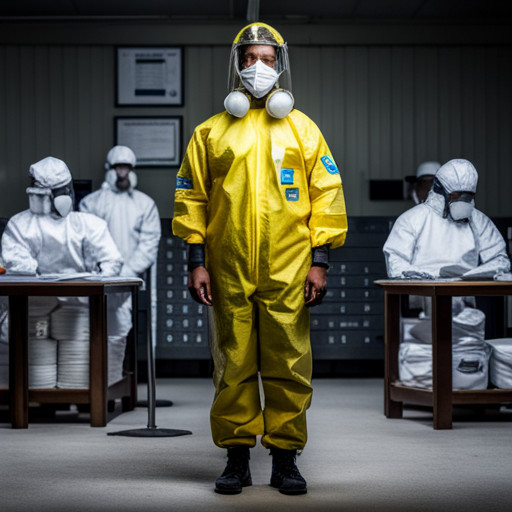Camp Lejeune Civilian Employees Health Risks and Legal Battles
The Camp Lejeune contamination crisis has unleashed a storm of legal battles, with civilian employees embedded at the eye.

This article probes the health risks endured by these employees, scrutinizes their legal struggles under the Camp Lejeune Justice Act, and elucidates the role of Veterans Administration in these lawsuits.
The narrative also examines the cascading impact on families, offering insights into legal representation and presenting firsthand accounts of the crisis.
Key Takeaways
- Civilian employees and their families at Camp Lejeune are at risk of developing cancers and diseases due to exposure to contaminants.
- Higher cumulative exposures to contaminants are associated with higher rates of cancers of the kidney, prostate, rectum, leukemias, and Parkinson's disease among civilian workers.
- The Camp Lejeune Justice Act allows survivors of those who developed cancer and died due to contaminated water to file lawsuits against the federal government, and the Veterans Administration presumes certain cancers as service-related, adding credibility to the lawsuits.
- Survivors, including spouses, children, and siblings, are contacting veterans organizations and Camp Lejeune water attorneys to determine if they qualify to file a lawsuit.
Understanding the Health Risks for Civilian Employees at Camp Lejeune

Extensive tests conducted by the Centers for Disease Control (CDC) revealed that civilian employees at Camp Lejeune and their families face an elevated risk of developing various cancers and diseases, particularly those with higher cumulative exposures to contaminants.
The prevalence of diseases exhibited a significant correlation with levels of exposure, with higher incidence rates observed in those possessing more prolonged or intensive contact with the contaminants. A spectrum of conditions, including kidney, prostate and rectal cancers, leukemias and Parkinson's disease, were identified.
These long term health effects underline the necessity for rigorous oversight and protective measures. The findings underscore the critical role of the Agency for Toxic Substances and Disease Registry (ATSDR) in safeguarding both military and civilian populations from detrimental health outcomes linked to exposure to hazardous substances.
Legal Options and Battles Faced by Affected Civilians

Affected individuals confront a complex array of legal challenges and options, as they seek justice and compensation for the serious health issues linked to prolonged exposure to hazardous contaminants.
These legal battles often involve intricacies of environmental and health law, coupled with the necessity of proving causation between exposure and health effects.
The compensation options available to survivors are largely determined by the Camp Lejeune Justice Act, which facilitates lawsuits against the federal government. Eligibility for such legal recourse is not limited to military personnel but extends to civilian employees and their families.
Thus, the pursuit of justice and compensation necessitates a comprehensive understanding of these legal provisions, corroborated by scientific evidence linking health issues to the contaminants.
Noteworthy Lawsuits: A Closer Look

Noteworthy lawsuits linked to long-term exposure to hazardous contaminants merit a detailed evaluation, providing critical insights into the struggles and triumphs of the victims seeking justice and compensation. A focus on notable settlements and ongoing litigation underscores the gravity of the situation.
| Case | Outcome |
|---|---|
| Ensminger v. United States | Ongoing litigation; seeking compensation for medical expenses |
| Dever v. United States | Notable settlement; awarded funds for medical treatment |
| Anderson v. United States | Ongoing litigation; petition for compensation |
| Jones v. United States | Notable settlement; awarded funds for suffering & loss |
These cases, reflective of the battle waged by victims, resonate with the audience, underscoring the necessity for justice and compensation for those afflicted, due to exposure to hazardous contaminants.
Updates on the Camp Lejeune Justice Act

Recent updates on the judicial act related to the military base indicate significant progress in lawsuits pertaining to water contamination.
The Camp Lejeune Justice Act, a key legislative piece, has been instrumental in facilitating these legal battles. Notably, an appointed committee of seven attorneys is set to expedite Camp Lejeune Justice Act lawsuits, a move indicative of the gravity and urgency accorded to these cases.
Despite this, Marines have been cautioned against expecting immediate remuneration from their claims, underscoring the intricacies of such legal processes.
In parallel, widows of Camp Lejeune victims have been active in seeking justice for water contamination deaths. This surge in legal activity reflects the gravity of the situation and the collective pursuit of justice.
The Role of Veterans Administration in the Legal Battles

In the unfolding legal proceedings, the Veterans Administration plays a pivotal role, presuming certain cancers as service-related and thus adding credibility to the lawsuits. This involvement becomes instrumental in the ongoing legal battles, specifically with regard to the substantiation of claims associated with health risks emanating from Camp Lejeune.
The table below provides an overview of the key contributions of the Veterans Administration in these legal proceedings:
| Veterans Administration's Role | Impact on Lawsuits | Correlation with Service-Related Cancers |
| Presumption of certain cancers | Adds credibility | Direct |
| Assessment of service records | Facilitates legal process | Indirect |
| Provision of medical records | Bolsters evidence | Direct |
Hence, the Veterans Administration's active participation marks a critical juncture in the quest for justice for the impacted veterans and their families.
Impact on Families: The Unseen Victims

The impact on families, often referred to as the unseen victims, reveals a distressing facet of the contamination issue, with long-term health consequences extending beyond military personnel to their unsuspecting dependents.
Studies indicate a significant increase in various health conditions, including cancers and neurological diseases, among civilian employees and their families who lived and worked at Camp Lejeune.
The impact on mental health is equally alarming, with psychological distress often reported among these populations.
This health crisis has led to considerable financial struggles for families, as they grapple with high medical costs and, in many instances, loss of income due to debilitating illnesses.
Thus, the contamination issue at Camp Lejeune has far-reaching and multifaceted implications for affected families.
How to Seek Legal Representation


Personal accounts of survivors who have experienced water contamination shed light on the dire consequences and profound impacts of such environmental crises. These narratives underscore the severity of the situation at Camp Lejeune, where civilian employees and their families were exposed to contaminated water for extended periods.
Reports highlight the detrimental children's health outcomes, with a high prevalence of birth defects and childhood cancers.
Long term effects on the community are evident, as health complications extend into adulthood, including increased rates of kidney and prostate cancers.
The psychological burden on survivors and their families is substantial, affecting their quality of life and mental health.
These accounts emphasize the importance of environmental health interventions and the need for legal remedies for affected individuals.
Frequently Asked Questions
What Specific Contaminants Were Found in the Water at Camp Lejeune?
Investigations into contaminant sources at Camp Lejeune found volatile organic compounds such as trichloroethylene, perchloroethylene, benzene, and vinyl chloride in the water supply, prompting rigorous remediation efforts to address this environmental and public health concern.
How Do Civilian Employees’ Exposure Levels Compare to Military Personnel at Camp Lejeune?
Exposure levels to contaminants at Camp Lejeune varied significantly between civilian employees and military personnel, often correlating with occupational roles and duration of service, impacting healthcare options and compensation possibilities.
What Are the Specific Criteria to Qualify for Filing a Lawsuit Under the Camp Lejeune Justice Act?
To qualify for a lawsuit under the Camp Lejeune Justice Act, specific criteria include demonstrable health impact from water contamination exposure and valid survivor status. Justice Act limitations and legal representation choices should be carefully considered.
What Is the Process and Timeline for the Bellwether Trials for Camp Lejeune Water Contamination Plaintiffs?
Bellwether trials, indicative of future legal trends, involve a careful plaintiff selection process. This process, while detailed and investigative, lacks a set timeline, with its duration dependent on individual case complexities and judicial schedules.
How Do Families of Affected Civilian Employees Access Support and Resources Beyond Legal Representation?
Support networks and financial assistance are accessed by families of affected civilian employees through veterans organizations, town hall meetings, and direct contact with attorneys specializing in Camp Lejeune Justice Act claims.

This post has been generated by AI and was not reviewed by editors. This is Not legal advice. Please consult with an attorney.




